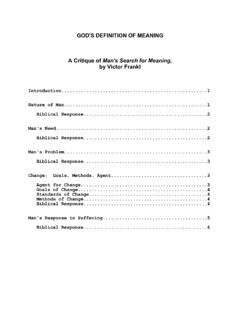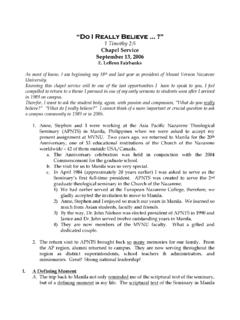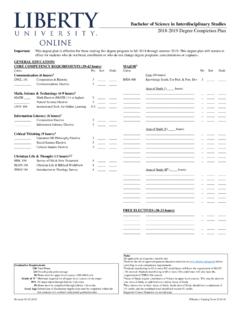Transcription of 33 Meyer Critique - Christian Discernment
1 1 JOYCE Meyer A Critique of Beauty for Ashes and Approval Addiction, by Joyce Meyer 1. introduction Joyce Meyer has become extremely popular through her speaking and numerous books. Although she is not a psychologist, her writings often reference the abuse she suffered in her childhood, and her teachings are similar to the popular psychological "wisdom" about the effects of child abuse. This Critique reviews two of her books: "Beauty for Ashes: Receiving Emotional Healing" (1994) ["BA"] and "Approval Addiction: Overcoming Your Need to Please Everyone" (2005) ["AA"]. There is certainly some truth in these books, but it is hopelessly intertwined with psychological error, and great caution is needed. It is critical to emphasize that the abuse of children is a grievous sin and a real problem in our society. Christians need to respond with compassion, understanding, and hope.
2 This Critique is not intended to minimize the harm suffered or the seriousness of the problem, but rather to direct both the perpetrators and victims of such sin to God and His Word, and away from the unreliable theories and methods of modern psychotherapy that appear to offer help yet keep people in bondage. Meyer 's own troubled childhood forms the backdrop for much of her teaching. In Beauty for Ashes, Meyer points out the fact of her childhood abuse and expresses her belief that many people who appear "together" are inwardly quite troubled: "Many, many people seem to have it all together outwardly, but inside they are a wreck. That was my situation before I learned that the Lord's main concern is my inner life. Matthew 6:33 states that we are to seek first the kingdom (remember, it is within you) and His righteousness, and then these other things will be added unto us.
3 " (7BA, bold emphasis added) "I was sexually, physically, verbally and emotionally abused from the time I can remember until I finally left home at the age of eighteen." (12BA) There is a victim mentality that runs throughout Meyer 's writings. 2 It is extremely troubling to observe Meyer 's view of her own authority to teach. She appears to affirm biblical teachings about submission to authorities established by God: "The Bible teaches us to submit to If we will not submit to man's authority, we will not submit to God's authority either." (212AA) However, she refuses to even receive advice from her own husband on the content of her teaching: "I receive advice from Dave [ Meyer 's husband] in every area [of her ministry] except what I am teaching in our conferences and on television. I know I must receive that information from God's Spirit--and not Dave or others--if it is to be anointed.
4 I am a mouthpiece of God, and as such I must be led by Him in what I teach." (211AA) This attitude is quite dangerous, in that Meyer places herself beyond the reach of Discernment , criticism, or authority. In light of man's sinful nature, no human being is a "mouthpiece of God" so completely beyond the realm of biblical authority, instruction, or correction. 2. REVELATION/SCRIPTURE Meyer holds a distorted view of revelation and the manner in which God speaks to us, placing her own interpretations above others and often reading her psychological views into Scripture. As noted in the introduction , she claims direct revelation from God beyond His revealed Word: "It is also important to realize that God has different calls on our lives. Since He has called me to teach His Word, it was better for me to receive the truth I needed directly from Him.
5 However, that is not a rule for everyone." (44-45BA) At the beginning of one chapter, Meyer describes an incident where she prayed with a woman who had described a particular bondage in her life. Meyer had a "vision" of the woman standing on a track, and a "message" she believes came from God (59BA), but there is no indication that she counseled this woman from Scripture. Meyer places her own supposed "revelation" from God on the same level as Scripture. This is a dangerous practice. 3 In teaching others about receiving God's guidance, Meyer acknowledges the power of Scripture yet relies more on feelings than on the study of God's Word and the instruction of ordained church leaders: "God's Word has inherent power in it. When we release our faith in His Word, that power is released into our lives and situations to help us." (117AA) "Sometimes we don't feel peaceful about a certain thing, and we don't have any idea why.
6 The Scriptures teach us to follow after peace; it is one of the ways God leads us." (182AA) She does leave some room for consideration of the views of others: "We must not automatically reject what others think, but we must not let it control us You are an individual, with individual rights. Don't let anyone steal from you what Jesus died to give you--which is the freedom to follow the leading of the Holy Spirit for you as an individual." (165AA) Notice, here, that Meyer 's claim about "what Jesus died to give you" is contrary to the gospel. He died to free us from the penalty and power of sin. Biblically, believers are to test what they hear, like the Bereans, to see whether it conforms to Scripture. This Critique , for example, is intended to help Meyer 's readers to carefully discern between truth and error in her teachings. Her view of revelation is tainted with feeling-oriented language and claims to divine revelation beyond Scripture, rather than the study of what God actually says in His Word.
7 Eisegesis. Meyer repeatedly engages in eisegesis, reading her own psychologized worldview into Scripture, rather than engaging in exegesis to draw out of the passage the message that God intended. Following are three examples of this practice. 1. In John 3:22ff, certain disciples brought a report to John the Baptist about the fact that Jesus was baptizing people. Meyer assumes, without support from Scripture, that these messengers were insecure and/or attempting to stir up jealousy: 4 "This message was carried to John in a wrong spirit; it was intended to make him jealous. The disciples who brought the report were obviously insecure and being used by the devil in an attempt to stir up some wrong feelings in John toward Jesus." (132BA) Scripture is silent as to the motives of the messengers. It is possible they were jealous, but not "obvious" as Meyer claims. They might have been honestly confused and seeking clarification.
8 Much of Meyer 's teaching is focused around insecurity and its alleged effects, and she imposes this onto Scripture rather than seeking to understand what God intends to say. This particular passage emphasizes the deity of Jesus Christ, as John the Baptist points out in his response (see John 3:27-36). 2. Meyer also reads her views about insecurity onto the well-known text (Matthew 7:24-27) where Jesus instructs us to build our lives on His Word, the "rock": "The Bible encourages people to build their lives on solid rock, not If we try to build our lives on what people say and think of us--how they treat us, how we feel, or our past mistakes--we are building on sinking Before I experienced the healing power of Jesus Christ, my life was like a house built on shifting sand rather than solid rock. My foundation was weak. I was not secure, I did not like myself, and I was filled with guilt and shame from abuse.
9 " (187AA, emphasis added) This passage is about building our lives on the solid rock of God's Word. Of course, it is wrong to substitute the opinions of other people for the Word of God, but Meyer reads a great deal more into the text, presupposing her own psychological views about self-hate and insecurity. 3. Meyers believes that Jesus practiced "tough love," because "whenever possible He helped them help instructed them to take some particular action" (for example, the crippled man in Matthew 9:6, raising little girl in Mark 5:35-36, blind man in John 9:1-7): "Instead of merely feeling sorry for these people, Jesus moved them to action. He helped them get their minds off themselves and their problems, and He motivated them to do something about them." (210AA) 5 The well-worn phrase, "God helps those who help themselves," is not a biblical concept.
10 On the contrary, Christ died for us "while we were yet sinners" (Romans 5:8), spiritually dead in sin (Ephesians 2:1) and unable to resurrect ourselves. We do have biblical responsibilities to take action, and God has prepared good works for us to do as His redeemed people (Ephesians 2:10), but the accounts of Jesus' miracles have a completely different purpose. Matthew 9:6 explains the purpose of Jesus' command to the paralytic to take up his bed and walk. It was so the audience would know that Jesus Christ had the authority on earth to forgive sins. Only God has such authority. Jesus knew the evil thoughts of the scribes, who accused Him of blasphemy, and He responded with the command to the paralytic. Nothing in the text indicates that the paralytic was being encouraged to "help himself." Jesus command to the 12-year-old girl in Mark 5:35-43, to "arise" and walk, proved that she was not dead, as those from the synagogue official's house had announced (5:35).








